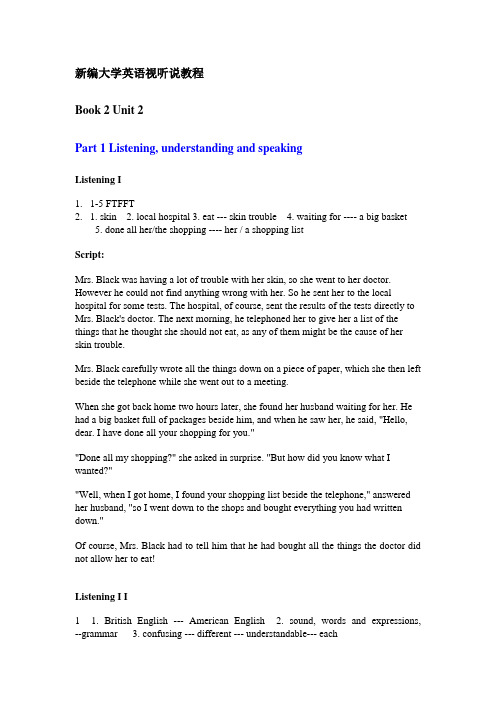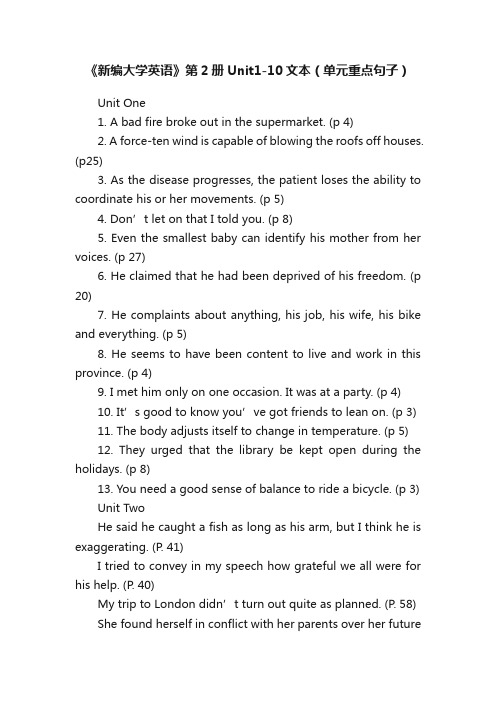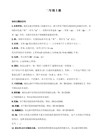新编大学英语-2-Unit-
浙江大学《新编大学英语综合教程(2)》(第3版)学习指南【词汇短语+课文精解+全文翻译+练习答案】

目 录Unit 1一、词汇短语二、课文精解三、全文翻译四、练习答案Unit 2一、词汇短语二、课文精解三、全文翻译四、练习答案Unit 3一、词汇短语二、课文精解三、全文翻译四、练习答案Unit 4一、词汇短语二、课文精解三、全文翻译四、练习答案Unit 5一、词汇短语二、课文精解三、全文翻译四、练习答案Unit 6一、词汇短语二、课文精解三、全文翻译四、练习答案Unit 7一、词汇短语二、课文精解三、全文翻译四、练习答案Unit 8一、词汇短语二、课文精解三、全文翻译四、练习答案Unit 9一、词汇短语二、课文精解三、全文翻译四、练习答案Unit 10一、词汇短语二、课文精解三、全文翻译四、练习答案Unit 1一、词汇短语Part 1. Preparationby its very nature就其本质而言unconditional [5QnkEn5diFEnEl] adj.无条件的,无限制的,绝对的【例句】The victorious army demanded unconditional surrender. 胜方要求敌人无条件投降。
【搭配】unconditional surrender 无条件投降live up to不辜负;做到;实践【例句】In some ways, we failed to live up to one another’s expectations. 在某些方面,我们互相的期望都落了空。
do one’s duty尽职责Part 2. Reading-Centered ActivitiesIn-Class Readingseverely [si5viEli] adv.严格地,激烈地【例句】Those responsible for this crime will be severely punished. 犯下这宗罪行的人将受到严厉惩罚。
severe [si5viE] adj.严厉的,严格的;剧烈的;严重的,严峻的【例句】He’s suffering from severe mental disorder. 他患有严重的精神病。
外研社2024新编大学英语_第四版_综合教程教学课件B4U2 Further development

Further development Unit project
3. Impact on Hangzhou 3.1 Economic benefits
The event is expected to promote tourism and boost local businesses, including hospitality, dining, and retail sectors. It will also create opportunities for local artisans and vendors, showcasing Hangzhou’s craftsmanship and culinary heritage. 3.2 Social and cultural enrichment
Unit project Additional activity Broaden our horizon
新编大学英语(第四版) 综合教程 Unit 2
Further development
目录 contents
Unit project Additional activity Broaden our horizon
新编大学英语(第四版) 综合教程 Unit 2
Further development Unit project
2.3 Rich experience Hangzhou’s track record of hosting international events, like
the 2016 G20 Summit and the 2022 Asian Games, positions it as an ideal venue for the Dragon Boat Racing Championship. These experiences have refined the city’s ability to manage large crowds, ensure top-notch hospitality, and implement sophisticated emergency protocols, crucial for the safety and enjoyment of all attendees. Leveraging this wealth of expertise not only guarantees the smooth operation of the event but also promises an enriching experience that highlights the city’s commitment to showcasing both the sport and its deep cultural heritage. Equipped with a highly skilled cadre of professionals and volunteers, Hangzhou stands ready to make the Dragon Boat Racing Championship a remarkable and unforgettable event.
新编大学英语(第四版)综合教程2教学课件-B2U1 Further development

Further development Additional activity
Sample answer walked that much, but we managed to push our limits by encouraging each other and the picturesque views encouraged us as well. So you see a good picture requires enough patience and a bit of good luck.
But that’s not the only reason why I present it. More importantly, it is one of the most impressive trips I’ve ever taken, which taught me to look deep into myself, to learn to appreciate the simplest way of living, and to feel more grateful for what I’ve had.
新编大学英语(第四版) 综合教程 Unit 2
Further development Unit project
Give a presentation
STEP
4
Give the presentation
The representative from each group gives a presentation to the whole class. A panel of judges will be formed by inviting one student from each group, and each judge will give each speaker a score out of 100, following the judging criteria below. 40% Content 40% Language 20% Delivery
Unit 2 Communication Problems新编大学英语第二版第二册课文翻译

Unit 2 Communication ProblemsSpeaking Different LanguagesJohn Gray[1] When Martians and Venusians first got together, they encountered many of the problems with relationships we have today. Because they recognized that they were different, they were able to solve these problems. One of the secrets of their success was good communication.[2] Ironically, they communicated well because they spoke different languages. When they had problems, they would just go to a translator for assistance. Everyone knew that people from Mars and people from Venus spoke different languages, so when there was a conflict they didn't start judging or fighting but instead pulled out their phrase dictionaries to understand each other more fully. If that didn't work they went to a translator for help.[3] You see, the Martian and Venusian languages had the same words but different meanings depending on the way they were used. Their expressions were similar, but they had different connotations or emotional emphasis. Misinterpreting each other was very easy. So when communication problems emerged, they assumed it was just one of those expected misunderstandings and that with a little assistance they would surely understand each other. They experienced a trust and acceptance that we rarely experience today.[4] Even today we still need translators. Men and women seldom mean the same things even when they use the same words. For example, when a woman says, “I feel like you never listen,” she does not expect the word “never” to be tak en literally. Using the word “never” is just a way of expressing the frustration she is feeling at the moment. It is not to be taken as if it were factual information.[5] To fully express their feelings, women would tend to exaggerate the facts a little bit for effect and use various superlatives, metaphors, and generalizations. Men mistakenly take these expressions literally. Because they misunderstand the intended meaning, they commonly react in an unsupportive manner. In the following chart ten complaints easily misinterpreted are listed, as well as how a man might respond unsupportively.Ten Common Complaints That Are Easily MisinterpretedWomen say things like this: Men respond like this:“We never go out.” “That's not true. We went out last week.”“Everyone ignores me.” “I'm sure some people notice you.”“I am so tired, I can't do anything.” “If you don't like your job, then quit.”“I want to forget everything.” “I don't think there's anything to forget.”“The house is always a mess.” “It's not always a mess.”“No one listens to me anymore.” “But I'm listening to you right now.”“Nothing is working.” “Are you saying it is my fault?”“You don't love me anymore.” “Of course I do. That's why I'm here.”“We are always in a hurry.” “We are not. Friday we were relaxed.”“I want more romance.” “Are you saying I am not romantic?”[6] You can see how a “literal” translation of a woman's words could easily mislead a man who is used to using speech as a means of conveying only facts and information. You can also see how a man's responses might lead to an argument. Unclear and unloving communication is the biggest problem in relationships. The number one complaint women have in relationships is: “I don't feel heard.”[7] Even this complaint is misunderstood and misinterpreted![8] A man's literal translation of “I don't feel heard” leads him to take the woman's complaint lightly. He thinks he has heard her if he can repeat what she has said. A correct translation of a woman saying “I don't feel heard” is: “I feel as though you don't fully understand what I really mean to say or care about how I feel. Would you show me that you are interested in what I have to say?”[9] If a man really understood her complaint, then he would argue less and be able to respond more positively. When men and women are on the verge of arguing, they generally misunderstand each other. At such times, it is important to rethink or translate what they have heard.说着不同的语言1 当火星人和金星人最初相聚时,也遇到了我们目前存在的许多人际关系问题。
大学英语听力b2_listening_unit_2_Communication

新编大学英语视听说教程Book 2 Unit 2Part 1 Listening, understanding and speakingListening I1.1-5 FTFFT2. 1. skin 2. local hospital3. eat --- skin trouble4. waiting for ---- a big basket5. done all her/the shopping ---- her / a shopping listScript:Mrs. Black was having a lot of trouble with her skin, so she went to her doctor. However he could not find anything wrong with her. So he sent her to the local hospital for some tests. The hospital, of course, sent the results of the tests directly to Mrs. Black's doctor. The next morning, he telephoned her to give her a list of the things that he thought she should not eat, as any of them might be the cause of her skin trouble.Mrs. Black carefully wrote all the things down on a piece of paper, which she then left beside the telephone while she went out to a meeting.When she got back home two hours later, she found her husband waiting for her. He had a big basket full of packages beside him, and when he saw her, he said, "Hello, dear. I have done all your shopping for you.""Done all my shopping?" she asked in surprise. "But how did you know what I wanted?""Well, when I got home, I found your shopping list beside the telephone," answered her husband, "so I went down to the shops and bought everything you had written down."Of course, Mrs. Black had to tell him that he had bought all the things the doctor did not allow her to eat!Listening I I1 1. British English --- American English 2. sound, words and expressions, --grammar 3. confusing --- different --- understandable--- each2. British EnglishI don’t know.What do you say?jumpertrouserschipschemist’s shopring them upHave you got an extra pen?Script:American and British people both speak English, of course, but sometimes it does not seem like the same language. In fact, there are some important differences between British and American English.First of all, they sound very different. Often, Americans don't say all the letters in each word. For example, Americans may say "I dunno" instead of "I don't know", or they may say "Whaddya say?" instead of "What do you say?"Sound is not the only difference between British and American English. The two languages have different words and expressions for some things. For example, some words for clothing are different. Americans use the word "sweater", but the British say "jumper". Americans wear "vests" over their shirts, but British people wear "vests" under their shirts. Americans talk about "pants" or "slacks", but the British talk about "trousers". The British chips are American French fries. A British chemist is an American drugstore. In Britain, if you are going to telephone friends, you "ring them up". In America, you "give them a call".There are also some differences in grammar. For example, Americans almost always use the helping verb "do" with the verb "have". They might say, "Do you have an extra pen?" The British often ask the question a different way. They might say, "Have you got an extra pen?"These differences can be confusing when you are learning English. But when the same language is used in different places, it is understandable that it changes in each place.Listening III11-6 T F F F F T21) small 2) pie 3) pine 4) big 5) small 6) pint 7) half 8) German9) warm 10) brown 11) English 12) a packet of 13) in the evening14) fried potatoes 15) crispsScript:Nick: Hi, Dieter. OK?Dieter: Oh, hi, Nick. Yes, I'm fine, except that I had a big problem ordering my drink.I didn't think my English was so bad!Nick: Your English is very good! What kind of problem?Dieter: Well, look at this beer I've got here—this warm, brown, English beer—it wasn't what I wanted!Nick: Why, what did you ask for?Dieter: Well, I just asked for a small beer. Then the barman asked what type of beer and said lots of names that I didn't understand—and something about a pie or a pine. I didn't understand anything!Nick: Oh, no! He probably said a pint! In English you don't ask for a big or a small beer. You ask for either a pint or a half. A pint's the big one.Dieter: So this one I've got here is a half?Nick: Yes, that's a half of bitter. Bitter's the name for that type of beer.Dieter: Ah, that's what he said—bitter! Well, it's very different from the beer we drink in Germany, I must say.Nick: Yes, I know. They call the German type of beer lager. So you have to ask for a half of lager, or a pint of lager.Dieter: OK. I understand that now. My another problem was chips. I asked for a packet of chips, and the barman said something strange—that they don't have chips in the evening, only at lunchtime. What did he mean?Nick: Yes, they have fish and chips, but I think you meant crisps. In England, chips are fried potatoes, you know, French fries. The ones you buy in a packet are crisps. Dieter: Well, in the end I didn't get anything to eat. So you see, I did everything wrong!Listening IV11-5 F T T F T2Examples: 1. MEN 2. HIS 3. MAN-madeConsequences: 1. mental image --- females/women 2. females/ women --- males/ men 3. citizensScript:(Mr. and Mrs. Jones are having a conversation one evening while Mrs. Jones happens to be looking at some of the textbooks her daughter, who is in the fifth grade, is using.)Mrs. Jones: Listen to what this book says. It really makes me angry! When talking about the settling of the western part of the U.S., it says, "MEN by the thousands headed west." Then on the very same page it says, "The average citizen in the United States is proud of HIS heritage."Mr. Jones: What's wrong with that? It's true. I don't understand why you are angry. Mrs. Jones: Why? Because women are left out!Mr. Jones: Everyone knows when the author says "men" or "his" in those sentences that the author means to include women.Mrs. Jones: I think you are wrong. When young people read these sentences, they simply do not form a mental image which includes females.Mr. Jones: Mm. Do you have other examples?Mrs. Jones: Yes I do! This book mentions "MAN-made improvements that have raised America's standard of living". A child will not think that females as well as males have made contributions when reading this.Mr. Jones: I still don't think it's very important.Mrs. Jones: Of course you don't! You're a man. But don't you want our daughter and other little girls to have the idea that they can be important citizens in their country, just as other women have been in the past?Mr. Jones: Well, I guess you're right. I hope not all textbooks are like that.Part 2 Viewing, understanding and speaking11-6 T F F F F T21) or another 2) seeing each other 3) boating 4) half an hour 5) someoneelse 6) anymore 7) Of course I do. 8) two different places 9) stupid Script:(The telephone rings in Julia's home, and she picks up the phone.)Julia: Hello!Michael: Hello, this is Michael.Julia: Hi, Michael. How are you?Michael: I'm fine. I miss you a lot though.Julia: Me, too. Can we get together again before you leave?Michael: Yes, sure! That's why I called you.Julia: Where should we meet?Michael: Mm, how about in front of Wanghu Hotel? (Some people are talking loudly in Julia's home.) That's not far from your home.Julia: Which hotel? I didn't hear you clearly.Michael: Wanghu Hotel.Julia: OK! What time?Michael: Mm, how about 12:30, tomorrow afternoon?Julia: OK, see you then.Michael: OK. OK, see you then.(In front of Wanghu Hotel, Michael is waiting. But Julia is waiting in front of Huanhu Hotel.)Michael: (He Looks at his watch, talking to himself.) It's 1:35 now! What's wrong with her?Julia: (She Looks at everywhere, hoping to see Michael, then talking to herself.) He's always late!Michael: (He Looks at his watch again, talking to himself.) Maybe she doesn't want to see me again?Julia: (She Looks at her watch, talking to herself.) It's almost 1:45 now! Where is he? Can it be that he is waiting at Wanghu Hotel? (Julia quickly rushes to Wanghu Hotel. There she sees Michael, who stands there waiting anxiously.)(In front of Wanghu Hotel.)Michael: Hi, Julia. You are so late. How come?Julia: I'm late?! I'm not late! I was waiting somewhere else! Believe it or not, I was waiting in front of Huanhu Hotel!Michael: Oh, my goodness! I've been waiting here for one hour. How come you went to Huanhu Hotel? I told you to come to Wanghu Hotel.Julia: But it sounded like Huanhu Hotel to me! You should've pronounced it more clearly.Michael: I'm sorry, but...but it never occurred to me you would have confused the two.Julia: I wish I'd realized that sooner, so that I wouldn't have waited there for so long. You know what? When you called yesterday, my mom had a group of friends over. They were so noisy that I could hardly hear you.Michael: That's why. Then how did you figure out that it might be here—Wanghu Hotel?Julia: Did it ever occur to you that we might be waiting at two different hotels? Michael: I guess not. I thought you were delayed by traffic or something.Julia: No! You don't think. Whenever we meet, we always have one problem or another.Michael: But last Saturday was all right. We had no trouble whatsoever seeing each other.Julia: It's always me who is waiting for you.Michael: That's not true! Wasn't I waiting for you today? And do you still remember the day when we went boating? I waited for you for about half an hour!Julia: If you don't want to wait for me, then wait for someone else.Michael: Julia, it's not that. You know what I mean.Julia: You just don't love me anymore.Michael: Of course I do. That's why I'm here. If I didn't love you, I wouldn't have waited here for an hour.Julia: But you never say "I love you" any more.Michael: Do you think I have to repeat the same three words all the time? Actions speak louder than words.Julia: But if you don't say it, how do I know?Michael: Come on, Julia. Don't be childish. Are we speaking the same language? It seems to me you always get me wrong.Julia: Well, if...if I hadn't realized what had happened we would still be waiting at two different places right now!Michael: Are you saying I'm stupid? Then why did you fall in love with me, then? Julia: Because I am even more stupid than you are! (Both laugh.)Michael: Now, let's forget it. Why don't we go for a walk in the park?Julia: Sure! (They walk away hand in hand.)Part 3 Video Appreciation and Singing for Fun1.Tip 1: Use open-ended questionsTip 2: Active listeningTip 3: The cocoonTip 4: Engage with the other personTip 5: Don’t make assumptionsTip 6: Avoid antagonistic sentences2. 1) closed questions 2) kill the conversation 3) summarizing 4) concentrate on 5) visualize a “cocoon”6) turn around and face that individual7) a particular topic 8) projecting your own thoughts or feelings9) a form of attack 10) a lot less conflictsPart 4 Further Speaking and ListeningListening I1) closer 2) regular 3) down 4) sense 5) envelope 6) convenience 7) instant 8) longer 9) positive 10) 2,252 11) quality 12) decreased 13) similar 14) inside 15) agreed 16) differentListening II1) status 2) definite 3) doubts 4) interrupt 5) power structure 6) establish and test 7) knowledge 8) power 9) sharing approach 10) encourageScript:At an early age, little girls' conversation is less definite and expresses more doubts, while little boys use conversation to establish status with their listeners.These differences continue into adult life. In public conversations, men talk more and interrupt other speakers more. In private conversations, men and women speak in equal amounts, although they say things in a different style. For women, private talking is a way to establish and test intimacy. For men, private talking is a way to explore the power structure of a relationship.Teaching is one job which shows the differences between men's and women's ways of talking. When a man teaches a woman, he wants to show that he has more knowledge, and hence more power in conversation. He uses his language to show this. When a woman teaches another woman, however, she is more likely to take a sharing approach and to encourage her student to join in.But it doesn't suggest that women are naturally more helpful. Actually, women feel they achieve power by being able to help others.Listening III1-5 F T F F TScript:Walking down the street, a dog saw an ad in an office window. "Help wanted. Must type 70 words a minute. Must be computer literate. Must be bilingual. Anequal-opportunity employer."The dog applied for the position, but he was quickly refused. "I can't hire a dog for this job," the office manager said. But when the dog pointed to the line that read "An equal-opportunity employer", the office manager sighed and asked, "Can you type?" Silently, the dog walked over to a typewriter and typed a letter without a mistake. "Can you operate a computer?" the manager inquired. The dog then sat down at a computer, wrote a program and ran it perfectly."Look, I still can't hire a dog for this position," said the office manager. "You have fine skills, but I need someone who's bilingual. It says so right in the ad."The dog looked up at the manager and said, "Meow."Listening IV1 1-6 T F T F T T2 1) an American education 2) fluent English 3) misses 4) nice5) little things 6) walking the dog 7) weather 8) snowy9) sunshine 10) boots 11) umbrella 12) a big smileScript:Ramon Romero is a seventeen-year-old boy from Bolivia. He speaks Spanish and a little bit of English.Ramon lives in the United States now, in Little Rock, Arkansas, with the Hutchinsons. They are not his real family. His real family is back in Bolivia. They cannot come to America because they have jobs and duties in their country and aren't able to leave. However, they do want their son to have an American education and be fluent in English.He misses his family and wishes to see them. It seems that no one understands his true feelings. It is difficult to listen to English all the time and then to express his thoughts in English. His American family is very nice to him and helps him in every way. In return, Ramon does little things to help the family. For instance, he takes the dog for a walk every morning and every evening.When he comes back from the morning walk, he tells Mrs. Hutchinson about the weather. This tells her how to dress her four-year-old son. On Tuesday, Mrs. Hutchinson asks, "How is the weather today?"Ramon answers, "It rain.""No, Ramon, in English we say, 'It's raining.'"On Wednesday, it rains again."It's raining today," reports Ramon.On Thursday, it snows. On Friday, the sun finally shines. Ramon is very happy that he doesn't have to wear boots or carry an umbrella. He comes into the house with a big smile on his face."How's the weather today?" asks Mrs. Hutchinson."Oh, today I am very happy," replies Ramon. "There is no weather."。
《新编大学英语》第2册Unit1-10文本(单元重点句子)

《新编大学英语》第2册Unit1-10文本(单元重点句子)Unit One1. A bad fire broke out in the supermarket. (p 4)2. A force-ten wind is capable of blowing the roofs off houses. (p25)3. As the disease progresses, the patient loses the ability to coordinate his or her movements. (p 5)4. Don’t let on that I told you. (p 8)5. Even the smallest baby can identify his mother from her voices. (p 27)6. He claimed that he had been deprived of his freedom. (p 20)7. He complaints about anything, his job, his wife, his bike and everything. (p 5)8. He seems to have been content to live and work in this province. (p 4)9. I met him only on one occasion. It was at a party. (p 4)10. It’s good to know you’ve got fr iends to lean on. (p 3)11. The body adjusts itself to change in temperature. (p 5)12. They urged that the library be kept open during the holidays. (p 8)13. You need a good sense of balance to ride a bicycle. (p 3)Unit TwoHe said he caught a fish as long as his arm, but I think he is exaggerating. (P. 41)I tried to convey in my speech how grateful we all were for his help. (P. 40)My trip to London didn’t turn out quite as planned. (P. 58) She found herself in conflict with her parents over her futurecareer. (P. 40)She just managed to hold back her anger. (P. 51)The book’s title misled me into thinking that it was a love story, but it was about cars. (P. 42)The children had an argument over what game to play. (P. 40) The idea rapidly gained acceptance in political circles. (P. 39) The power of speech distinguishes human beings from animals. (P. 50)Unit ThreeIn the face of great difficulty, she managed to keep her sense of humor.John has a very rigid attitude to the way he works.None of these social problems is unique to this country.That book is beyond the capacity of children who are still learning to read.That’s a remarkable achievement for some so young.The course will cover a whole range of topics.We won four games in succession.You need to channel your energies to something useful.Unit Four1. Profits have declined as a result of the recent drop in sales.2. A doctor writes the prescription and a chemist makes it up for you.3. Both your fears and your behavior are irrational.4. Despite her father’s reassurance she was still frightened of the dark.5. He wants to transfer some money to the account of his daughter.6. Her interest in flowers stems from her childhood in the country.7. Her views are backed up by the new scientific discovery.8. She cited three reasons why people get into debt.9. She’s become addicted to love stories.10. The judge reacted angrily to the suggestion that it hadn’t been a fair trial.11. The pub has recently extended its opening hours.12. To our great relief, the children all arrived home safely.Unit Five1. The students felt relieved when their teacher said that the mid-term examination was cancelled. (p 151)2. Classes will be called off on Thursday and Friday. (p 155)3. One’s conscious motives are often different from one’s subconscious ones. (p 141)4. Scientists have been working on methods to predict earthquakes. (p143)5. The castle dates back to the 14th century. (p 144)6. The dictionary is the largest volume on that shelf. (p 144)7. The teacher corrected the errors in Bill’s term paper. (p 141)8. When I heard the good news, I trembled with excitement. (p 154)Unit Six1. Our high living standards cause our population to consume25% of the world’s oil. (词P.192,句子课外)2. She is a very effective teacher. (词P.193, 句子课外)3. It’s impractical to have so many people all try to use this equipment at the same time. (词P.193, 句子课外)4. An English-language version of the book is planned for the autumn. P.1965. If you need advice, you have only to pick up the phone, orcome to see us. P.1846. My mother still regards me as a child. P.1847. People often underestimate the importance of the training. P.1958. The farmers fertilize their farmlands. (词P.182, 句子课外)9. The food was fairly good and the portions were sufficiently large to please the men. P.18310. This box holds the sacred relics of a saint. P.183Unit 71. He was sent on over 200 missions before being killed in action. (P229)2. It would be very hard to surpass this very high score. (P 230)3. Mother assured us that everything would be alright. (P227)4. Some of the staff are apt to arrive late on Mondays. (P239)5. The industrial revolution modified the whole structure of English society. (P 229)6. The meeting broke up in great confusion. (P242)7. Unfortunately the report was prepared in haste and contained several inaccuracies. (P 228)8. Where did you pick up English? (P 184)9. With regards to future oil supplies, the situation is uncertain. (P 231)10. You weren’t boring me.On the contrary, you were interesting me. (P 242)11. The form cannot be signed by anyone other than yourself. (P.250) Unit 8The game was all but over by the time we arrived. (P. 267)Before you depart, let me give you a word of advice. (P. 263) Do genes govern all characteristics of an individual? (P. 264)He gave his some money for the purchase of his school books. (P. 266)Her correspondence with Jim lasted many years. (非本册单词)I hated practicing, but I stuck to it, and now I can play pretty well. (P. 287)I love champagne but it’s not often I can indulge myself. (P. 276)If you don’t patent you inventions, someone might steal your idea. (P. 265)If you have any information concerning the recent accident, please call the police. (P. 275)Mick closely resembled his father. (P. 286)She anxiously scanned the faces of the men leaving the train in the hope of finding her husband. (P. 286)She came up with a new idea for increasing sales. (P. 287)She feels obliged to be nice to Jack because he’s her boss. (P. 285)The car reached speeds in excess of 100 miles per hour. (P. 275)The Jackson family had occupied this apartment for the past six months. (P. 276)X-rays have confirmed that he has not broken any bones. (P.263)Unit 9\A campaign was conducted for equal rights.After some consideration, we have decided to sell the house.All their arrangements should be completed prior to your departure.British weather can never be relied on---it is always changing.Cars were still something of a novelty at the beginning of the century.He gives us a lot of trouble--- but I like him all the time.Her speech made tremendous impact on everyone.He is accused of murder.I perceived a note of unhappiness in her voice.More vehicles are prohibited from driving in the town center.The world’s wealth is not fairly distributed between men and women.We failed utterly to convince him.He read rapidly but did not digest anything.The discussions stimulated a free exchange of our ideas.I was pacing back and forth while I waited for the news.In theory, things can only get better. In practice, they may well become a lot worse.What may you suspect her of having taken the money?Unit101. Charities such as Oxfam are always trying to recruit volunteers to help in theirwork. P.3592. National poverty was aggravated by rapid population growth. P.3553. Some people find that certain foods trigger their headaches. P.3604. Surgical techniques are constantly being refined. P.3595. That is a very substantial improvement in the present situation. P.3606. There has to be a clear assessment of the country’s social needs. P.3567. All the members of the team come from totally diversebackground. (词P.344,句子课外)8. What can we do to reverse the present trend of falling sales? (词P.346,句子课外)9. Hard work is fundamental to his success. (词P.367,句子课外)10. He is not able to cope with the difficulties of his new position. (词P.370,句子课外)11. He was labeled a beggar by the local people because of his clothing. (词P.368,句子课外)12. The dream had distressed her greatly. (词P.367,句子课外)。
新编大学英语Unit2课文翻译与课后练习答案

Unit 2 Myths and LegendsIn-Class Reading Why the Tortoise’s Shell Is Not Smooth为什么乌龟的背壳凹凸不平1 从远处他妻子们的那些小木屋里传来的低声细语,时不时地被歌声打断,但是奥康瓦还是听到了,这是妻子们同各自的孩子在讲民间故事。
爱克蔚菲和她的女儿爱金玛坐在一块小地毯上。
现在,轮到爱克蔚菲讲故事了。
霎时,低声细语静了下来,所有的眼睛都转向她们最喜欢的故事能手。
2 “很久以前”,她开始讲道,“所有的鸟儿都被邀请到天上赴宴。
它们非常高兴,开始为这盛大的日子做准备。
它们用颜料把自己的身体涂成深红色并画上漂亮的图案。
3 “乌龟看到了所有这些准备活动,并很快了解了事情的来龙去脉。
动物界里发生的任何事都逃不过他的眼睛,(因为)他狡黠无比,诡计多端。
他一听说这一天上的盛宴,不禁垂涎三尺。
那些日子正在闹饥荒,乌龟已经有两个月没好好吃一顿饭了。
他的身体就像一段枯柴棍在空荡荡的躯壳里咔咔作响。
于是他稳扎稳打地开始计划如何能到天上去。
”4 “但是他没有翅膀呀,”爱金玛说。
5 “别性急,”她母亲回答道,“故事(的关键)就在这里。
乌龟没有翅膀,但他去找鸟儿们,请求能跟他们一起去。
”6 “‘我们太了解你了,’鸟儿们听了他的请求后说道。
‘你诡计多端并且忘恩负义。
如果我们答应你,你马上就会施展诡计。
我们老早就把你看透了。
’7 “‘你们不了解我,’乌龟说。
‘我已经脱胎换骨了,不再是你们以前所知道的那个捣蛋鬼了。
相反,我现在既体贴又善良。
我已经认识到,给别人制造麻烦的人就是在给自己制造麻烦。
放心吧,我保证不给你们增添任何麻烦。
’8 “乌龟巧舌如簧,没过多久,所有的鸟儿都一致认为,他确实已经脱胎换骨了,于是每只鸟儿都给了他一根羽毛,用这些羽毛,乌龟做了两只色彩绚丽的翅膀。
9 “最后,这盛大的日子终于来到了,乌龟第一个到达了集合地点。
等所有的鸟儿都来齐了,他们就一块儿动身。
新编大学英语第二册课文翻译完整版

说着不同的语言
1 当火星人和金星人最初相聚时,也遇到了我们目前存在的许多人际关系问题。他们之所以能够解决这些问题是因为他们认识到相互之间的差异。他们成功的秘诀之一就是良好的交流沟通。2 具有讽刺意味的是,他们交流沟通的成功却是因为他们说着不同的语言。当他们遇到问题时,就去找翻译帮助。众所周知,他们每个人都清楚火星人和金星人语言不同,因此,一旦遇到冲突,他们并不去评论是非或争斗,相反,他们会掏出自己的短语词典,以便更全面地理解对方。如果这样无效的话,他们就去找翻译帮助。3 你明白吗?你知道,火星语和金星语用的词相同,但是所表达的含义却不同,这要根据词的用法来决定。两种语言的措词尽管相似,但是措辞的内涵却不同,所侧重的情感也不同。相互之间很容易误解。因此,当交谈出现问题时,他们推断这只不过是一个误解而已,是预料中的,只要得到些许帮助他们就必定能够彼此理解。他们体验到的是一种相互间的信任和认同,这是我们今天很少能体验到的。4 即使在今天,我们依然需要翻译。男人和女人即便用词相同,他们所表达的含义也很少相同。例如:当女人说:“我觉得你从不听我说话,”她希望对方不要从字面上理解“从不”这个词。使用“从不”这个词只不过是用来表达她此时此刻感到非常失望。不要把它当作真实的意思来理解。5 为了充分表达她们的感受,女人们往往会把事实夸大一点以引起注意,并使用各种最高级,隐喻以及推论。男人错误地从字面上来理解这些用语。他们误解了女人想要表达的意思,便常常以不赞同的态度,来回答她们。下面列有十句女人的抱怨话,这些都是很容易被男人误解的,同时也列出了男人以不赞同的态度可能做出的回答。容易被男人误解十种抱怨==女人这样说:男人这样回答:==“我们从不一起出去。” “不对,我们上周还出去过。”==“所有人都不理睬我。” “我敢肯定有人关注你。”==“我太累了,我什么也干不了了。” “要是你不喜欢自己的工作,那就辞职。” ==“我讨厌所有的一切。” “我没觉得有什么让你讨厌的。”==“家里总是乱七八糟。” “并不总是这么乱。”==“再也没人听我说话了。” “我不正在听你说嘛。”==“没有一样东西管用。” “你是说这都是我的错?”==“你不再爱我了。” “当然爱你,要不我干嘛还在这儿。”==“我们老是处于匆忙状态。” “没有,周五我们刚轻松过。”==“我需要更多的爱情。” “你是说我不够多情?”6 可以看出,习惯于把语言用作传达事实看出,男人的回答又是怎样引起争吵的。含糊的、缺乏爱心的交流沟通是男女之间的最大问题。女人们在交往中的第一大抱怨是“我觉得没人听见我说的话。”7 即使这种抱怨也会被误解和曲解。8 男人从字面上去理解“我觉得没人听见我说的话”,这使他漠然地对待该抱怨。他认为只要他能重复说出她的话就表明他听到她所说的话了。对于女人所说的“我觉得没人听我说话”的正确理解是:“我觉得好像你没有完全理解我真正想说的话,或者你不关心我的感受。你能不能表示一下你对我非说不可的话感兴趣呢?”9 如果男人能真正理解她的抱怨,那么他就会少些争吵,就能更积极地做出反应。当男人和女人到了要争吵的地步时,他们往往是误解了对方的意思。这时候,重新考虑和解释自己所听到的话是很重要的。
- 1、下载文档前请自行甄别文档内容的完整性,平台不提供额外的编辑、内容补充、找答案等附加服务。
- 2、"仅部分预览"的文档,不可在线预览部分如存在完整性等问题,可反馈申请退款(可完整预览的文档不适用该条件!)。
- 3、如文档侵犯您的权益,请联系客服反馈,我们会尽快为您处理(人工客服工作时间:9:00-18:30)。
新编大学英语-2-Unit-5-教案Unit Five LanguageI. Theoretical basis:College English Syllabus (1999); College English Curriculum Requirements (2004)II. Teaching Aims:In this unit students are required to:1) get to know some useful information concerning the topic of the reading passages in this unit and to know more about English culture;2) do some preparation activities such as discussion, group work, etc. to practice their spoken skill and communicative skills;3) grasp some new words and try to use these words which help them to enrich their vocabulary;4) read the in-class reading passage in a limited time and grasp some expressions and grammatical points in the in-class reading passage to improve their reading comprehension;5) do some post-reading exercises and some after-class reading to practice what they have got to know in class to improve their English comprehensive skills.; 6) translate some typical sentences into Chinese or English by using some expressions learned in the reading passages to acquire some translating skills and better their translating abilities.III. Teaching MethodologyMainly applying task-based approach and communicative one to construct a student –centered classroomThe whole learning and teaching proceed is tended to follow the model of pre-task------task cycle------post-taskIV. Time DistributionAccording to Ss’ English learning traits and regulations, the focus of the learning strategies, and the English level of current students; we are going to finish this unit in 8 periods: Listening & Speaking (2 periods); In-class Reading (2 periods); Exercise & After-class Reading (2 periods); Further Development &Writing (2 periods).Period I&II listening and speakingI、Teaching Content1) T’s background knowledge introduction as recruitment and Ss’discussion on the topic of learning skills, and enlarge their vocabularyon this unit.2) Listening of 2 passagesII、Teaching designPart One: PreparationAnswer the following questions?1. About how many most widely used languages are there in the world?⏹(About 100 most widely used languages)2.What languages are used by more second-language speakers than native-speakers as a result of the imperial expansion?⏹(English and French)3.Say something about Helen Keller.1) When did Helen Keller become completely blind?2) What was Helen like before Anne Mansfield Sullivan became her teacher?3)How did Helen manage to learn?4)How many foreign languages did Helen learn? What are they?4.Helen Keller (1880-1968), author and lecturer, who, though blind and deaf since the age of two, graduated with honors from Radcliffe(1904) and became a prominent worker for social reforms. Her books include:●The Story of My Life(1902);●The World I Live in(1908);●Out of the dark(1913);●My Religion(1927);●Midstream-My later Life(1929);●Let Us Have Faith(1940);●Sketch for a Portrait(1956)5.What languages are used by the United Nations?They are English, French, Chinese, Russian and Spanish.Part Two: Listening-centered ActivitiesListening I1.Explain new words (soap, critic, represent, balanced,crisis, loyalty, wooden, endlessly, cause)2.Listen to the passage and answer the questions you hearon the tape (see page 115).3.Listen to the passage again and fill in the blanks withwhat you get from the tape (see page 115).Listening II1.Explain the new words (desirable, interpreter, ultimate,mimic, imitate, due to, numerous, identity)2.Listen to an interview on language learning. Note down inthe blanks the three questions the interviewer asked (seepage 116).3.Listen to the interview again. Then read the choicesprovided in Exercise 1 and choose the right answersaccording to what the interviewee said.Part Three: Assignmentto prepare the new words on the textbook.Period 3&4 ReadingI、Teaching ContentThe title of the text is “How I Discovered Words” (intensive reading). Language points explanation, exercise.II、Teaching Objects1) Understand and master new words and phrases: childlike, flushed, honey-,succeed, keenly, -less, to and fro, be about to do sth, prey on/upon, grope one’s way cross/along/ pass/toward, impress, persist, only to, give birth to, etc.2) Improve Ss micro-reading skills and the ability of thinking, inferenceand judge in English.III、Teaching DesignA.GreetingB. Check the assignment: new words dictationC. Pre-Reading ActivitiesNew Words1.childish / childlikechildish:(of an adult) (behaving)like a child; immature; silly(贬)(举止)像孩子似的,幼稚的,傻里傻气的●Don’t be so childish! 不要这么孩子气!●His childish remark embarrassed everyone.childlike: like or characteristic of a child; innocent,孩子般的,天真的,无邪的●childlike enjoyment/trust/honest孩子般的欢乐/信任/诚实●She has a childlike enthusiasm for the circus.●Tears came to his eyes as he remembered her childlike look.2.flushed: very excited or pleasedto be flushed with success/pride/joyto flush: to fill with pride; encourage (fig) 使得意,使激动,使兴奋●The young parents were flushed with happiness at the birth of theirson.●Flushed with victory, the soldiers knew no weariness.⏹to flush:(of a person, his face)become red; blush●The girl flushed(up) when the man spoke to her.●He flushed when he saw her.●Her forehead was flushed with fever.●You flush when your face goes red eg. when you are hot orembarrassed.3. honeysucklehoney---honeymoon, honeybee, honeysweet(蜜一样甜), honeycomb(蜂窝), honeylipped(嘴甜的)4. keenlykeen adj.: eager, anxiousto be keen to do sth; to be keen on sth/sb●We are especially keen to attract young people.●We did invite him, but he didn’t seem very keen on coming.●People are keen when they show interest and enthusiasm.●You are keen on an activity if you enjoy it and spend a lot of time onit.5.wordless ---less: without; not havinghomeless, leafless, meaningless, endless, treeless, hopeless, helpless, doubtless, heartless, useless, harmless, careless, speechless, powerless, fatherless, childlessD. In-Class Reading ActivitiesLanguageLanguage Pointsto and fro: back and forth; backwards and forwards; from side to side;in all directions来回地e.g. Seeing all the people walking to and fro outside the office, I becamemore worried.They ran to and fro in the street.The man walked to and fro while he waited for the phone.to be about to do sth: to be going to do sth; to be to do sth正要/即将做某事e.g. You are about to do something when you are just going to do it, or will be doing it soon.He was about to be transferred to another part of the country.He waited until she was about to leave.He met her in the doorway just as she was about to go away.3. to prey on/upon: to produce great trouble烦恼,折磨e.g. Something preys on your mind when it worries you.His worries preyed on his mind.The thought that he was responsible for her death preyed on his mind.Feelings of quilt preyed on his mind.➢to prey on: to take/hunt/catch as prey捕食,杀害A bird or animal preys on another when it hunts and kills it as food.Cats prey on birds and mice.Strong animals prey on weaker ones.➢to prey on: to steal from; attack; make sb one’s victim掠夺,使某人成为某人的牺牲品Ships were preyed upon by pirates.4.to succeed vt: to come next after接替,取代某人或某物[same as take over]e.g. You succeed someone in a job or positionThey have decided after all to let the right man succeed me.The silence was succeeded by the striking of a clock.时钟鸣响声打破了寂静。
